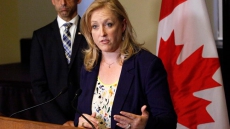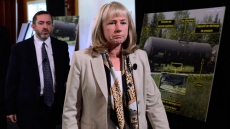GATINEAU, Que. - Online delivery services such as Netflix and YouTube would be harmed if regulations for Canada's broadcast industry are extended to the digital world, says Google Canada.
The content driver issued the warning Monday at the start of two weeks of Canadian Radio-television and Telecommunications Commission hearings looking at how consumers view and pay for TV programming.
Some of Canada's conventional broadcasters and distribution firms argue that online platforms don't contribute to the country's programming delivery system and should be forced somehow to make mandatory contributions.
But legitimate online services do, in fact, contribute to the system through licensing of content, said Jason Kee, Google's public policy and government relations counsel.
And mandatory contributions would in the end cost consumers, if a contribution mechanism could even be devised and enforced, he said.
"Mandatory contributions would likely increase costs to consumers in the form of increased subscription fees and creators in form of diminished license fees or revenue share for them," he told the hearing.
In his presentation, Kee suggested that instituting an online content contribution system would face "practical challenges."
The CRTC opened the hearings, dubbed "Let's Talk TV," with the aim of developing new regulations to tackle the dramatic, technology-driven changes that have taken place in the television industry.
Companies including Google and Netflix are now in the mix, offering TV program delivery services, streamed online.
Their presence has put the conventional television industry under pressure, straining revenues as advertising dollars move to other media.
The big cable companies are also feeling the effects of change, particularly with a desire voiced by the federal government to move to a so-called "pick-and-pay" system that would require an unbundling of TV channel choices.
The CRTC has also proposed allowing local TV stations to shut down their transmitters, which would require consumers of free, over-the-air programming to pay for TV through one of many service providers.
In opening the hearings, CRTC chairman Jean-Pierre Blais suggested that rules protecting specific channels or broadcasters could be thrown out in favour of new regulations that empower Canadians to get TV programming how they want it, when they want it.
"Rather than protect specific channels or broadcasters or a particular way of doing business, we must ensure that the television system meets the needs and interests of Canadians, both today and in the years ahead," said Blais.
The group Friends of Canadian Broadcasting says the regulatory changes proposed by the CRTC would harm local TV stations and would not help consumers.
"Pick-and-pay along with the other significant changes on the table ... will likely harm local broadcasting, especially local news, which is the kind of programming Canadians think is most important," the group said in a statement.
"In fact, local, independent broadcasters-stations in small- and medium-sized markets are blunt that the changes could force them off the air."






